Ron DeSantis just signed a law that will stop ethics investigations before they can start
Florida's governor wanted changes to the state's ethics laws. State lawmakers obliged.

This is Seeking Rents, a newsletter and podcast devoted to producing original journalism — and lifting up the journalism of others — that examines the many ways that businesses influence public policy across Florida, written by Jason Garcia. Seeking Rents is free to all. But please consider a voluntary paid subscription, if you can afford one, to help support our work.
The Governor’s Office was furious.
Investigators at the Florida Commission on Ethics had just completed a probe into whether the top aide to Gov. Ron DeSantis had ordered subordinates to pressure lobbyists into donating to DeSantis’ ill-fated presidential campaign. They hadn’t found any evidence to support the complaint, which had been filed by one of the governor’s political opponents. And the prosecutor assigned to the case had recommended that the complaint be dismissed.
But DeSantis’ team was angry there had been any investigation at all.
In a scathing response, first reported by Politico Florida, the top lawyer in the DeSantis administration ripped into Ethics Commission staff. DeSantis general counsel Ryan Newman also called on the commission to make changes — including a “reform” that would prevent the agency from probing similar complaints in the future.
The Ethics Commission declined to make any changes. But a few months later, the Republican-controlled Florida Legislature did — by passing a bill that did just what the DeSantis administration wanted.
Government watchdog groups across the state warned that the legislation would cripple enforcement of laws meant to hold corrupt politicians accountable. But DeSantis signed it into law anyway — though the normally brash politician signed this particular bill quietly, behind closed doors, and then waited until 7:30 pm on a Friday night to announce it.
Senate Bill 7014 makes numerous changes to Florida’s ethics laws, most of which took effect the moment DeSantis signed the bill. One of the most consequential of those changes will prevent the Florida Commission on Ethics from acting on an ethics complaint unless the person filing it has “personal knowledge or information other than hearsay” about the alleged ethics violation.
That is expected to stop the state ethics commission from acting on any future complaints based solely on investigations published by news organizations — like the ones that so enraged the DeSantis administration, which were filed by the chairperson of the Florida Democratic Party and based primarily on reporting by NBC News.
It’s a major change; the executive director of the Ethics Commission has said it “marks a significant shift” in the way the agency operates.
It also happens to mirror one of the “reforms” that Newman, DeSantis’ general counsel, had urged the commission to adopt.
The provision requiring all future ethics complaints to be based upon “personal knowledge” first emerged in the Florida Senate. But the Senate did not reveal the change publicly until late in the process, after any opportunity for questions or comments from the public had passed.
Katie Betta, a spokesperson for the Florida Senate, said the “personal knowledge” provision was not added to Senate Bill 7014 at the behest of the Governor’s Office. Some in the Senate were aware the Governor’s Office had called for changes at the Ethics Commission. But Betta said the Senate arrived at the idea independently, based on similar concerns shared by senators and Senate staffers.
“It was not included in the legislation at their [the Governor’s Office’s] request,” Betta said.
Newman did not respond to a request for comment.
The Governor’s Office and Senate were certainly singing from the same songbook on the issue.
For instance, when Newman urged the Ethics Commission to rewrite its rules, he specifically cited the Florida Elections Commission, which investigates potential campaign-finance violations and is already prohibited by law from investigating complaints based on hearsay. Newman also emphasized that the Ethics Commission’s current practices were vulnerable to “politicization.” And he suggested that the status quo was unfair to those accused of ethical violations.
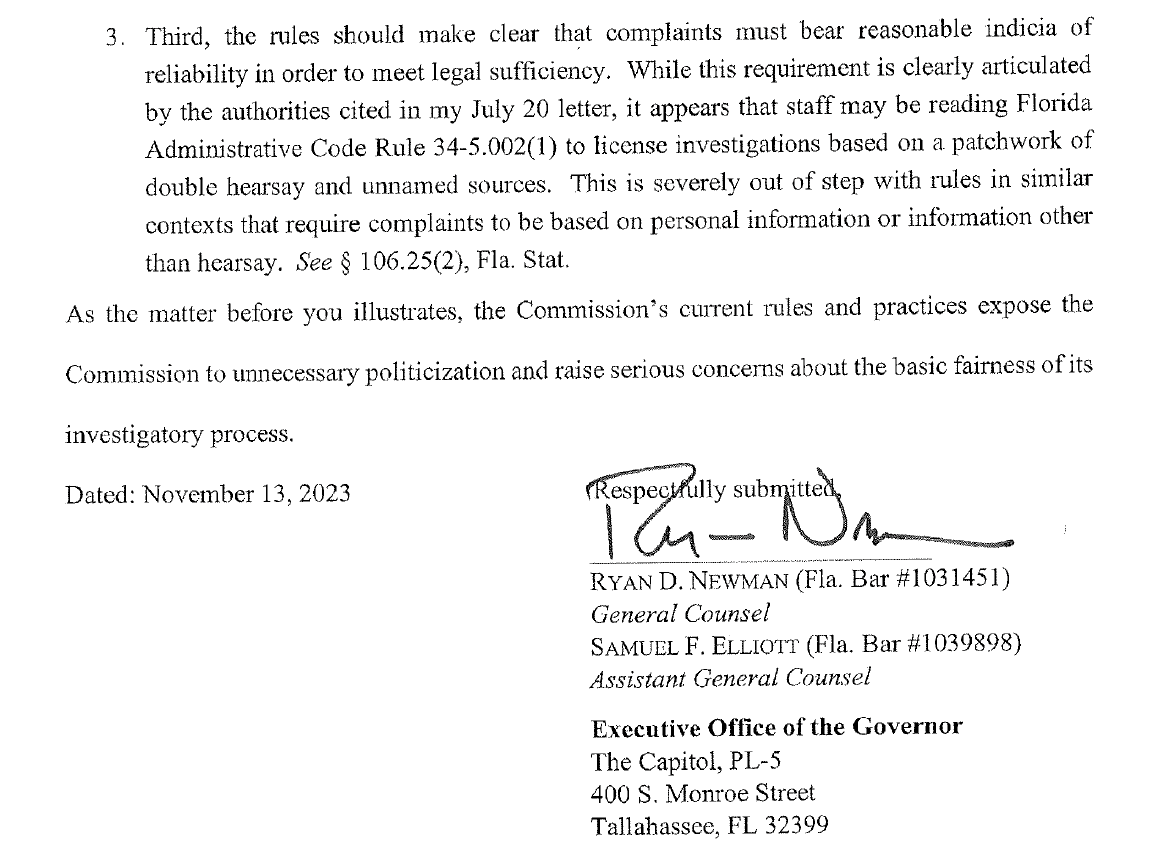
And when the Senate first unveiled its plans to add the “personal knowledge” requirement to Senate Bill 7014, Senate staffers prepared an internal document explaining the rationale for the change. In that document, which was obtained in a public records request, the Senate said the change was needed for three reasons: To protect against politically motivated complaints; to ensure fairness for the accused; and to align with similar rules at agencies like the Florida Elections Commission.
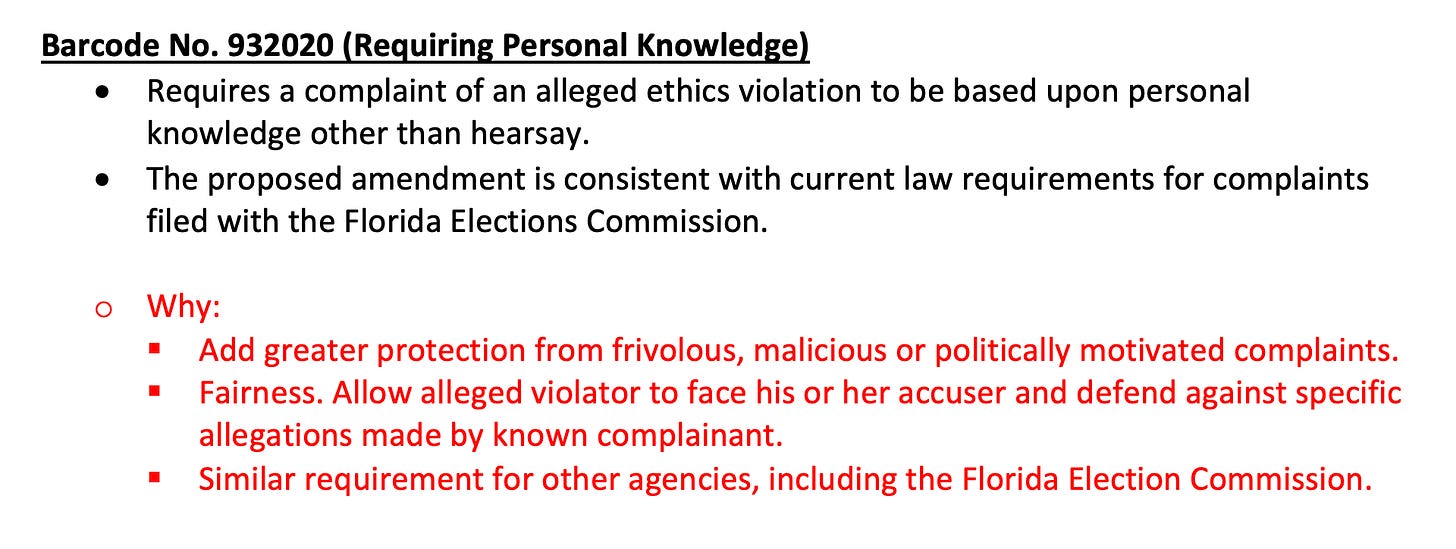
Senate Bill 7014 will also handcuff ethics offices run by local governments around Florida, which operate independently of the state office.
Another section of the bill would impose the same “personal knowledge” requirement on complaints filed with local agencies.
But it would also prohibit local ethics agencies from acting on anonymous tips. And, most importantly, it would stop local agencies from launching investigations on their own — turning them into purely passive bodies. (The state ethics commission is already prohibited from acting on anonymous tips or independently initiating investigations.)
The new restrictions on local ethics investigations were also added to Senate Bill 7014 by the Florida Senate. They follow a high-profile case in which the ethics office in Miami-Dade County independently launched an investigation into a then-city commissioner who had previously served in the Florida Senate. The former commissioner and senator — Republican Alex Diaz de la Portilla — was ultimately arrested on corruption charges, though he has pled not guilty.
Now, the Governor’s Office and Senate are not wrong when they say that ethics complaints in Florida are often weaponized for political purposes.
Partisans in Florida frequently file thinly sourced complaints against opponents. Then they try to persuade a legitimate news organization into writing a story about it — or just pay a “pink slime” operation to do it instead. The goal is to generate an unflattering headline from a seemingly independent news source that can be used in attack ads.
But Senate Bill 7014 is a case where the cure is worse than the disease.
And it’s not at all obvious that this new law will even solve the problem of politicized ethics complaints. Political operatives will almost certainly keep filing complaints and trying to turn them into headlines that can be used as attack ads — even if the Ethics Commission can’t actually do anything about their complaint.
Instead, the true goal of Senate Bill 7014 seems to be making sure that ethics investigators don’t ever get a chance to start sniffing around.
Because they might actually find something.




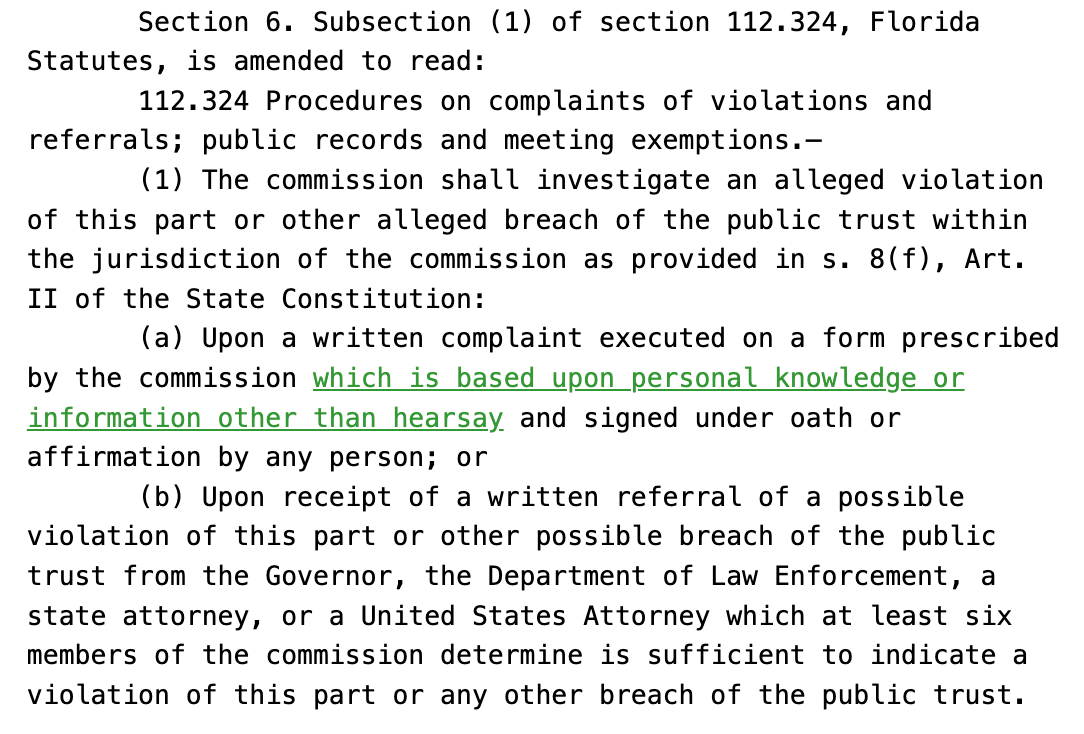

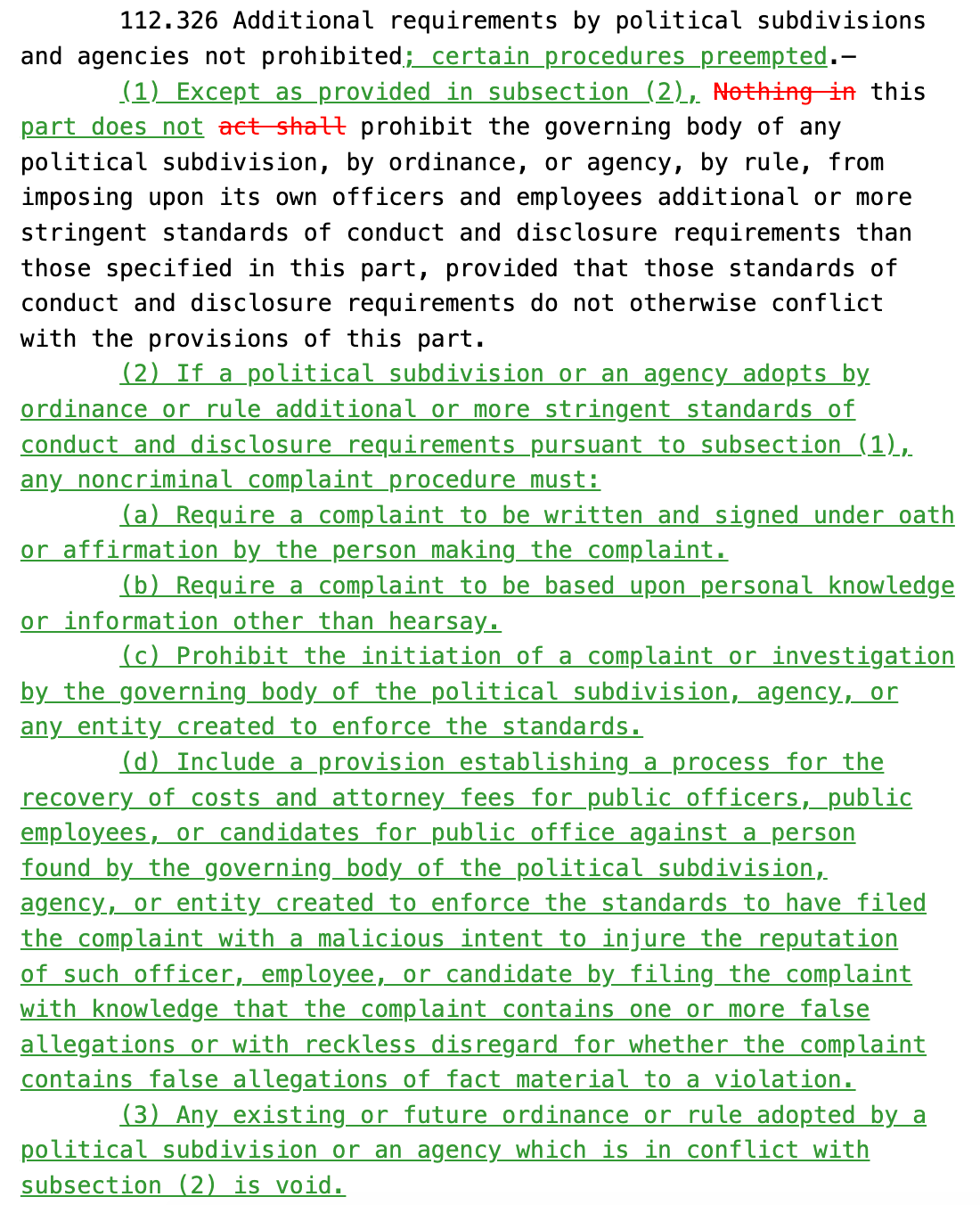
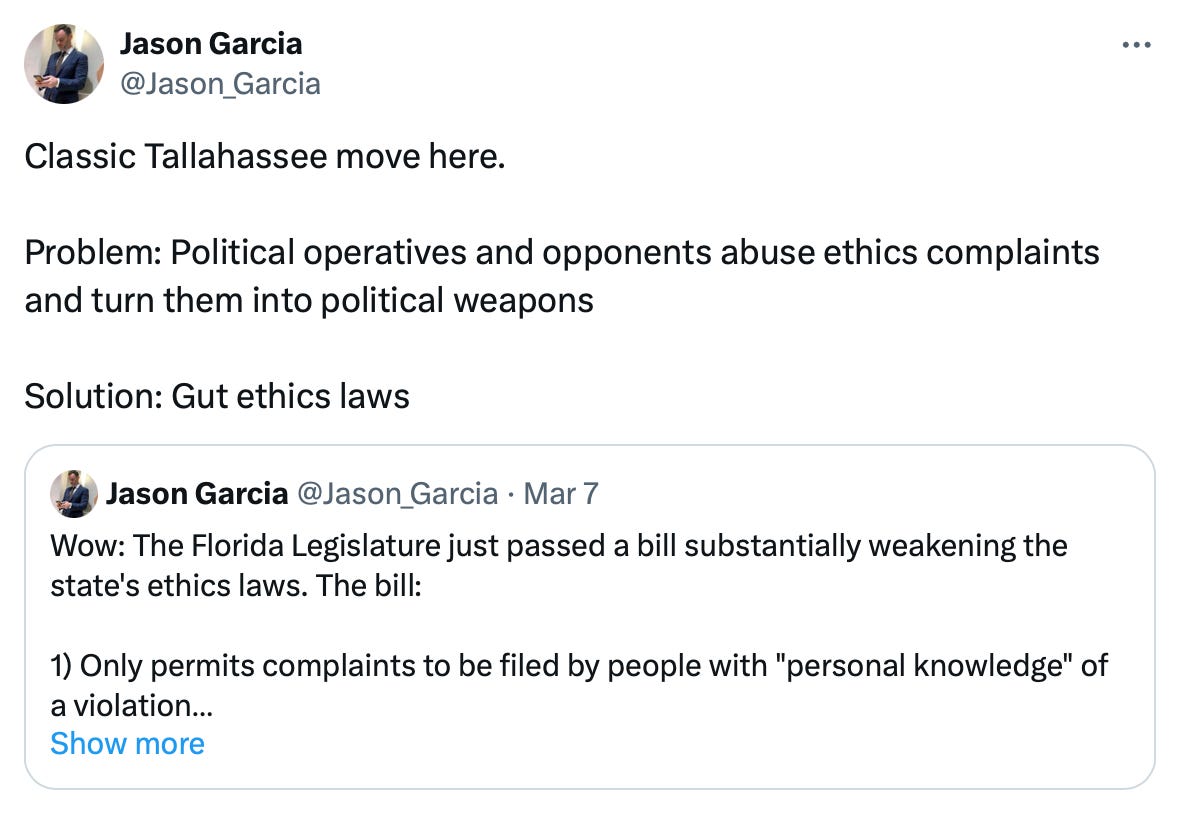

Florida residents are Phucked when Ron and the cheating Republicans hide, obfuscate and limit and basically stop the release of the Public Records information! When does someone stand up at the state level and demand compliance?!!!
For the benefit of those interested in Florida Ethics Complaints and the importance of this program in deterring public corruption, please find a link to an initial investigation and then a follow-up investigation of a public official on an economic development board that doled out tens of millions in cash grants. The project name morphed over time from Blue Water to LifeSync to Continuum Labs to CareSync. The public official and his brother, State Senator Ben Albritton, were closely tied to the grant, as were two State Representatives. As with many investigations, underneath the cover of propriety lies a murky bottom. Here are links to the two official public record investigations: https://bit.ly/4cfD1dj AND a supplemental investigation four months later as more evidence was discovered -- https://bit.ly/3VHRBmG